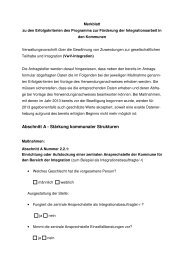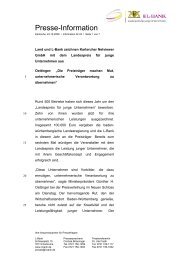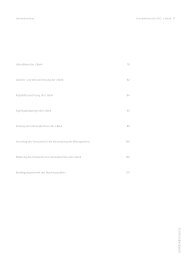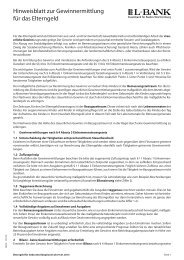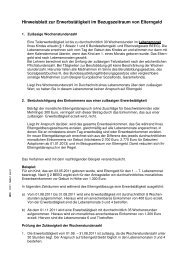Landeskreditbank Baden-Württemberg - L-Bank
Landeskreditbank Baden-Württemberg - L-Bank
Landeskreditbank Baden-Württemberg - L-Bank
You also want an ePaper? Increase the reach of your titles
YUMPU automatically turns print PDFs into web optimized ePapers that Google loves.
THE STATE OF BADEN-WÜRTTEMBERG<br />
GENERAL<br />
Location, Area and Population<br />
The Federal Republic of Germany was founded on May 24, 1949 when its constitution, codified in the<br />
Grundgesetz (the “German Constitution”), took effect. <strong>Baden</strong>-Württemberg is one of Germany’s 16 states<br />
(Länder), together with Bavaria (Bayern), Berlin, Brandenburg, Bremen, Hamburg, Hesse (Hessen), Lower<br />
Saxony (Niedersachsen), Mecklenburg-Western Pomerania (Mecklenburg-Vorpommern), North-Rhine<br />
Westphalia (Nordrhein-Westfalen), Rhineland-Palatinate (Rheinland-Pfalz), Saarland, Saxony (Sachsen),<br />
Saxony-Anhalt (Sachsen-Anhalt), Schleswig-Holstein and Thuringia (Thüringen).<br />
The State of <strong>Baden</strong>-Württemberg<br />
<strong>Baden</strong>-Württemberg is located in southwestern Germany. It is bordered on the east by Bavaria, on the north<br />
by Hesse, on the west by the Alsace region of France and Rhineland-Palatinate, and on the south by Switzerland.<br />
The largest cities are Stuttgart, Mannheim, Karlsruhe, Freiburg and Heidelberg.<br />
<strong>Baden</strong>-Württemberg encompasses an area of 13,803 square miles, or approximately 10% of Germany’s total<br />
area of 137,829 square miles. <strong>Baden</strong>-Württemberg is the third-largest state of Germany by area, after Bavaria and<br />
Lower Saxony.<br />
At the beginning of 2003, <strong>Baden</strong>-Württemberg had 10.7 million inhabitants, or 12.9% of Germany’s total<br />
population of 82.5 million. <strong>Baden</strong>-Württemberg is the third largest state of Germany by population, after the<br />
states of North Rhine-Westphalia and Bavaria.<br />
Politics and Foreign Relations<br />
Many governmental powers have been allocated by the Constitution to the federal government. The states<br />
have for instance legislative jurisdiction regarding such areas as the educational system, cultural affairs and<br />
police powers. The state enforces and administers not only state laws but also, subject to supervision by federal<br />
authorities, most of the federal laws in Germany. The administration of the courts on the lower level is the<br />
responsibility of the states whereas the administration of the highest court is the responsibility of the federal<br />
government. There is no separation between the state and the federal judicial system as in the United States.<br />
<strong>Baden</strong>-Württemberg, like the other states of Germany, has an elected parliament and an administration headed by<br />
a Prime Minister (Ministerpräsident) who is elected by the state parliament.<br />
On March 25, 2001, elections for representatives to the parliament of <strong>Baden</strong>-Württemberg were held. The<br />
parliament of <strong>Baden</strong>-Württemberg currently consists of the following numbers of representatives of four political<br />
parties: the Christian Democratic Union (CDU), 63 representatives; the Social Democratic Party (SPD), 45<br />
representatives; Alliance 90/the Greens, 10 representatives; and the Free Democratic Party (FDP/DVP), 10<br />
representatives; the CDU and FDP have formed a government in coalition. The next elections will be held in the<br />
spring of 2006.<br />
Because foreign relations are reserved to the German federal government under Article 32 of the German<br />
Constitution, <strong>Baden</strong>-Württemberg may not maintain foreign relations with other countries without the consent of<br />
the German federal government.<br />
48



